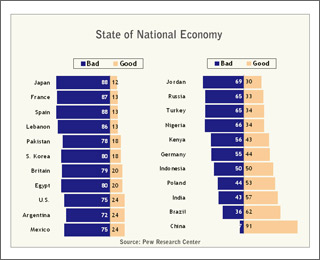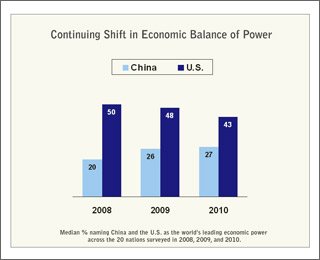The World Still Looks to Obama for Leadership
The World Still Looks to Obama for Leadership

WASHINGTON: After more than a year in office, US President Barack Obama remains highly respected in most parts of the world. But bucking the trend is four of five major Muslim countries, where he enjoys the confidence of less than half the population. Responses in the just-released 2010 survey of 22 nations, including the US, by the Pew Research Center’s Global Attitudes Project are far more positive about Obama’s new presidency than they were for his predecessor. But the poll also shows clouds on the horizon over Obama’s policy towards the Israel-Palestine conflict and sanctions against Iran.
The poll was conducted between April 7 to May 8, 2010.
Obama’s status defies widespread assumptions that the overwhelming international public approval of America’s first African-American chief executive was bound to crash once the afterglow of his historic election faded. American soft power, eroding through much of the last decade, has rebounded despite the American roots of the recent economic crisis, escalation of the war in Afghanistan and failure to take steps against climate change.
Nevertheless, the generally positive view of Obama and the US coexists with significant concerns about the perceived American unilateralist approach to world affairs and disagreement about some key US international policies, such as what to do about the Iranian nuclear weapons program and Obama’s handling of the Israeli-Palestinian dispute. This dichotomy runs counter to the Bush years, when specific foreign criticism of US foreign policy ran hand in hand with anti-American and anti-Bush sentiment, suggesting that anti-Americanism displayed early in the last decade reflected antipathy towards Bush.

Obama is broadly popular. Majorities or pluralities in 16 of the 22 countries Pew surveyed expressed at least some confidence in the US president to do the right thing regarding world affairs.
This includes 90 percent of Germans, 76 percent of Japanese and 84 percent of Nigerians. Only 14 percent of Germans, 25 percent of Japanese and 55 percent of Nigerians expressed confidence in Bush during his last year in office.
After a spike in anti-Americanism during the Bush administration, the US image abroad has recovered. America’s favorability is now on par with that found at the end of President Bill Clinton’s time in office, 1993 to 2001. Responders in 17 of the 21 foreign countries had a positive view of the US, and favorability improved markedly in Russia, China and Japan, all key players on the world stage.
Nonetheless, in five of six predominantly Muslim countries Pew surveyed, more than half of those polled lacked confidence in Obama, and the US remains a pariah in four Muslim countries Pew surveyed: Egypt, Jordan, Pakistan and Turkey.. One in 12 Pakistanis, one in three Egyptians and one in four Turks said they supported the US president, despite Obama visits to Egypt and Turkey in 2009. Only in Indonesia, where Obama spent time as a child, was he popular.
In Egypt, for example, America’s favorability rating dropped to 17 percent, the lowest percentage observed in Pew Global Attitudes surveys conducted in that country since 2006 – a striking decline as Obama delivered his much anticipated address to the Islamic world from Cairo in 2009.

Moreover, opinions have declined sharply in Mexico, where resentment against a restrictive immigration law in the border state of Arizona has fueled a backlash against the US and Obama, despite the president’s immediate public criticism of the measure.
Approval of Obama and the US does not prevent publics around the globe from disagreeing with US foreign policy.
The continuing war in Afghanistan gets a decidedly mixed review among US NATO allies. The British and the French were evenly split on whether their troops should be kept in Afghanistan until the country is stabilized or should be withdrawn now. In Germany, 58 percent favored immediate withdrawal. By comparison, only 45 percent of Americans wanted US troops in Afghanistan removed.
If Afghanistan is the current irritant in US relations with the world, Iran could be the next one.
The Pew poll found widespread opposition to Iran acquiring nuclear weapons. The notable exception was Pakistan, the only nation surveyed in which a majority favored Iran’s nuclear-weapons program. And there was considerable support for tougher economic sanctions against the Islamic Republic – the survey was taken before the recent UN Security Council vote backing sanctions. Many people were willing to consider using military force to prevent Iran from acquiring nuclear capabilities, including, surprisingly, roughly three in five people in France and about half of those who oppose Iran’s program in Germany, Spain and Britain.
Still, the Pew Global Attitudes survey foreshadows potential tension between the US and other leading powers over what to do about the Iranian nuclear program. Americans were more likely than the Europeans, Japanese, Chinese, Indians or Russians to approve of economic sanctions against Tehran or to support taking military action to stop the Islamic Republic from acquiring nuclear arms. Americans were among the least likely willing to live with a nuclear-armed Iran.
Global publics were also critical of how Obama has handled the Israeli-Palestinian conflict. The Pew survey was carried out before the recent uproar over the Israeli navy intercepting supply ships headed for Palestine. Nevertheless, of people in 22 nations, including the US, only majorities of the French, the Nigerians and the Kenyans approved of Obama’s handling of this Middle East dispute.
Obama generally received good grades for how he handled the world economic crisis. And, despite ample reason to blame Wall Street’s loose-lending practices and Washington’s lax regulation for the recent global financial meltdown, world publics do not blame the US for the Great Recession. In fact, in most societies Pew surveyed, people held themselves accountable before pointing the finger at Uncle Sam.
Nevertheless, America’s reputation as the world’s preeminent economic power has suffered. The US was cited in 14 of 22 nations as the world’s leading economic superpower.
China is on the rise: In the 2009 Pew survey, people in only two countries saw China as the premier economy. In 2010, populations in eight nations saw China in that light. Roughly half of the French, Germans and Japanese ceded the top spot to China. And even in the US, about equal proportions of respondents accorded superpower status to China and America.
Global publics differed about how China’s newfound preeminence affected their nation. Among those who thought China was already the economic superpower, publics in 13 of 21 countries saw this as a good thing, most overwhelmingly so. But people in eight countries thought China’s economic leadership role was a bad thing, including the US, all the EU countries surveyed, Turkey and India.
Eighteen months into the Obama administration, America’s stature in the world has rebounded. The economic crisis, escalation of the war in Afghanistan, failure to act on climate change and tensions in the Middle East have not undermined that support to any significant extent. Obamamania and pro-Americanism may have more legs than many cynics thought possible. This wellspring of global good will is a resource that the Obama White House can draw on in support of American foreign policy.
Bruce Stokes is the international columnist for the National Journal. Click here for the full report.